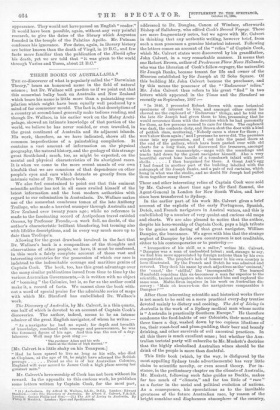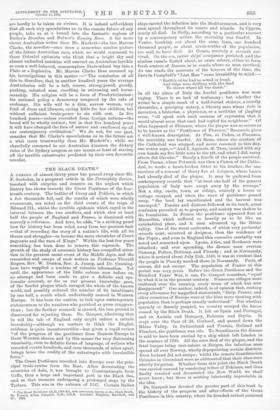THREE BOOKS ON AUSTRALASIA.* THE co-discoverer of what is popularly
called the " Darwinian Theory," bears an honoured name in the field of natural science ; but Dr. Wallace will pardon us if we point out that this somewhat bulky book on Australia and New Zealand which bears his name is little more than a painstaking com- pilation which might have been equally well produced by a mind of far commoner mould. The fact is, that descriptions of a country at second-hand generally make tedious reading, and though Dr. Wallace, in his earlier work on the Malay Archi- pelago, showed an intimate knowledge of that portion of the world, we believe he has never resided, or even travelled, in the great continent of Australia and its adjacent islands. His work, therefore, as we have indicated, shows all the common imperfections of a painstaking compilation. It contains a vast amount of information on the physical geography, the natural history, and the geology of this strange great South-land ; much, too, as might be expected, on the mental and physical characteristics of its aboriginal races.
It is when we come to the more recent annals of our own kinsfolk that we are conscious of that dependence on other people's eyes and ears which detracts so greatly from the intrinsic value of Dr. Wallace's book.
We also feel constrained to point out that this eminent scientific author has not in all cases availed himself of the latest information and the beet modern authorities with regard to our colonisation in Australasia. Dr. Wallace makes use of the somewhat cumbrous tomes of the late Anthony Trollope, who made a hurried scamper through Australia and New Zealand over twenty years ago ; while no reference is made to the fascinating record of Antipodean travel entitled Oceana, by Professor Froude,—a work full, no doubt, of the author's characteristic brilliant blundering, but teeming also with lifelike descriptions, and in every way much more up to date than Trollope's.
Allowing for the great drawback involved in the fact that Dr, Wallace's book is a compendium of the thoughts and observations of other people, we have, it must be confessed, in this work a fairly complete account of those vast and interesting countries for the possession of which our race is indebted to the indomitable courage and maritime genius of Captain Cook. The book, too, has this great advantage over the many similar publications issued from time to time by the various Australian Governments,—it is written with no object of " booming" the Colonies, but is, so far as the author could make it, a record of facts. We cannot close the book with- out a word of special praise for the admirable series of maps with which Mr. Stanford has embellished Dr. Wallace's work.
The Discovery of Australia, by Mr. Calvert, is a thin quarto, one half of which is devoted to an account of Captain Cook's discoveries. The author, indeed, seems to be an intense admirer of the great English navigator, of whom he writes:— "Asa navigator he had no equal; for depth and breadth of knowledge, combined with courage and perseverance, he was the foremost figure of his ago. And this was the son of a day- labourer. Well may the poet sing The gardener Adam and bin wife Smile at the claims of high dement,' " [Mr. Calvert is a little shaky on his Tennyson.] " Had he been spared to live as long as his wife, who died at Clapham, at the age of 93, ho might have adorned the British
peerage Proud as she is of her Australian Colonies, England will ever accord to James Cook a high place among her greatest men."
Mr. Calvert's hero-worship of Cook has not been without its reward. In the appendix to this curious work, he publishes some letters written by Captain Cook, for the most part, • (1.) Australasia. By Alfred It. Wallace, LL.D., D.O.L. London; Edward Stanford.--(2 ) The Discovery of Australia. By Albert T. Calvert, P.R.G.B. Lemke: George Philip and Bon.—(3.) The Art of Living in Australia. By Philip Ii. Muskat. London ; Eyre and 13pottiewoode. addressed to Dr, Douglas, Canon of Windsor, afterwards Bishop of Salisbury, who edited Cook's Second Voyage. These are mere fragmentary notes, but we agree with Mr. Calvert in thinking that any authentic writing, however brief, from such a man possesses a genuine historical interest. Following the letters comes an account of the " relies " of Captain Cook, which Mr. Calvert states were discovered by his grandfather, John Calvert, in a very remarkable manner. It seems that one Robert Brown, author of Prodromus Flom Nova3Hollandw, who was the librarian of Cook's fellow-voyager, the naturalist Sir Joseph Banks, became tenant for life and owner of the Museum established by Sir Joseph at 32 Soho Square. Of this building Mr. John Calvert became the purchaser, and by this means the possessor of the " Endeavour' relics." Mr. John Calvert thus refers to his great " find " in two letters which appeared in the Times and the Standard so recently as September, 1887 :-
"" In 1840, I presented Robert Brown with some botanical specimens of interest to him, and amongst other curios he showed me the cupboard of Endeavour' things, and he told me the late Sir Joseph had given them to him, presuming that he would reverence them with the devotion which he had personally for them, as few persons seemed to care for them. The cupboard was dark, the contents dirty, and Brown shut the door with a kind of pettish slam, muttering, Nobody cares a straw for them ; I won't show them again ;' and I presume he never did. The premises came into my possession, and I cut into the panel doors at the end of the gallery, which have been pasted over with old charts for a long time, and discovered the treasures, amongst which were some manuscripts,—maps with the soundings and tracks laid down by the great navigator himself. Also a very beautiful carved bone handle of a tomahawk inlaid with pearl
shells I then bargained for them. A Great Auk's egg I had found in another part of the building labelled with the autograph of Sir Joseph Banks, and a pair of red curtains, which hung in what was the studio, and no doubt Sir Joseph had pulled them together many times."
These and other interesting relics of Captain Cook were sold by Mr. Calvert a short time ago to Sir Saul Samuel, the Agent-General in London for New South Wales, and have since been transferred to Sydney.
In the earlier part of his work Mr. Calvert gives a brief account of the exploits of the early Portuguese, Spanish, Dutch, and French navigators in Austral waters, and this ig embellished by a number of very quaint and curious old maps and charts. We are also pleased to notice that the author, despite his hero-worship of Captain Cook, pays a high tribute to the genius and daring of that great navigator, William Dampier, the buccaneer. We agree with him that the strange neglect of Dampier by his own countrymen is not creditable, either to his contemporaries or to posterity :- " Irrespective of his skill as a sailor," writes Mr. Calvert, " Dampier was a man of undoubted talent ; and, strange to say, we find him more appreciated by foreign nations than by his own compatriots. The prophet's lack of honour in his own country is here illustrated. By the French and Dutch he was admired and revered. They deck his name by such adjectives as the' eminent,' the exact,' the ' skilful,' the incomparable.' The learned Humboldt considers this ex-buccaneer a man far superior to the scientific, trained navigators who succeeded him and explored the same seas. Malte-Brun inquires in his work on Australian dis- covery : Mais oit trouve-t-on des navigateurs comparables tIt Dampier ?'" After these interesting scientific and historical works there is not much to be said on a mere practical every-day treatise devoted mainly to dietary and cooking. The Art of Living in Australia is the work of a Sydney medical man whose motto is " Australia is practically Southern Europe." He therefore condemns the food-habits of our Colonists, their meat-eating three times a day, washed down by too copious libations of tea, their roast-beef and plum-pudding, their beer and brandy drinking, and other survivals of evil ancestral practices. In all this there is much excellent sense ; but whether the Aus- tralian teetotal party will subscribe to Mr. Muskett's doctrine that the highly alcoholised Australian wines should be the drink of the people is more than doubtful.
This little book (which, by the way, is disfigured by the most appalling Sydney trade advertisements) has very little claim to scientific novelty, or even sound theory. For in- stance, in the preliminary chapter on the climate of Australia, Mr. Muskett, following such false guides as Buckle, makes far too much of "climate," and far too little of " race " as a factor in the social and political evolution of nations. As a consequence, his speculations as to the inevitable greatness of the future Australian race, by reason of the bright sunshine and diaphanous atmosphere of the country, are hardly to be taken au serieux. It is indeed self-evident that all such airy speculations as to the remote future of any people, take us at a bound into the fantastic regions of Butler's Erewhon and Bulwer's Coming Race. A far more clever Australian writer than Mr. Muskett—the late Marcus Clarke, the novelist—once drew a somewhat sombre picture of the future Australian race, which we would commend to those Colonial optimists who think that a bright sky and almost unlimited sunshine will convert an Australian larrikin or even a well-behaved, commonplace State-school boy into a Plato or a Sephoeles. Mr. Marcus Clarke thus summed up his investigations in this matter :—" The conclusion of all this is, therefore, that in another hundred years the average Australasian will be a tall, coarse, strong-jawed, greedy, pushing, talented man, excelling in swimming and horse- manship. His religion will be a form of Presbyterianism ; his national policy a democracy tempered by the rate of exchange. His wife will be a thin, narrow woman, very fond of dress and idleness, caring little for her children, but without sufficient brain-power to sin with zest. In five hundred years—unless recruited from foreign nations—the breed will be wholly extinct; but in that five hundred years it will have changed the face of nature and swallowed up all our contemporary civilisation." We do not, for our part, consider that Mr. Clarke's speculations as to the future are a whit more trustworthy than Mr. Muskeg's ; while we cheerfully commend to our Australian kinsmen the dietary rules of the Sydney surgeon as one means at least of staving off the terrible catastrophe predicted by their own favourite novelist.



















































 Previous page
Previous page